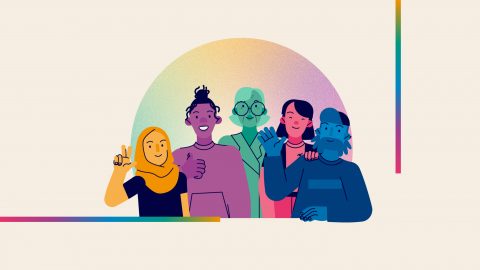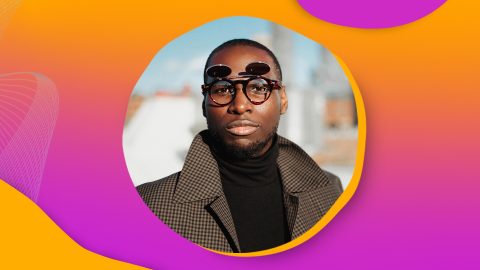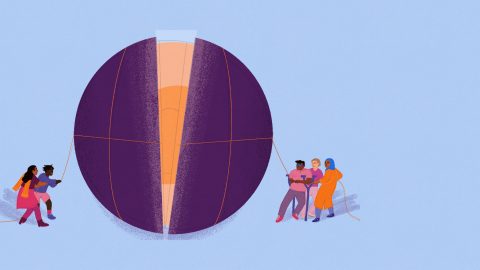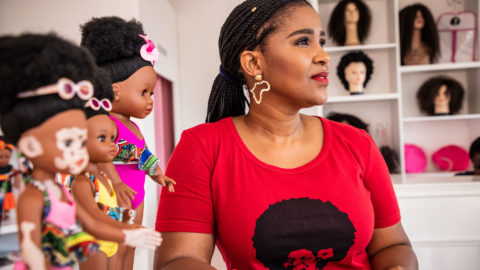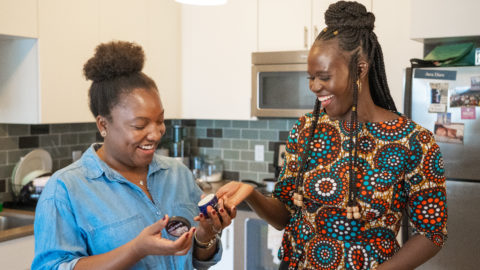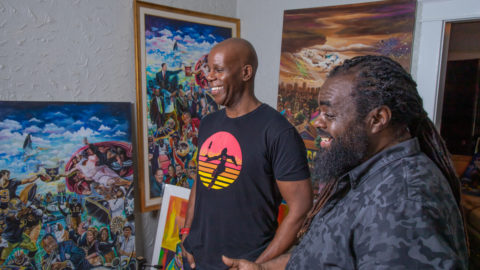Pursuing ‘mistura’: Rodney Williams on the beauty of diversity at Microsoft Brazil
One employee learns that big ideas require many small steps forward and complex challenges like social, political, economic, and racial diversity require perseverance.
Rodney Williams is constantly surprised by where life has taken him: a native Chicagoan living in São Paulo, Brazil, as an African American “gringo”; a consummate bachelor turned family man; a baseball player who loves live Samba music.
When Rodney’s career at Microsoft took him from Seattle to the company’s São Paulo office in Brazil, something surprised him.
“I saw a lot of black people all around me, but I didn’t see them in my meetings. I didn’t see them eating in top restaurants across the table from me,” he said.
When he took speaking engagements, he got looks of surprise after being introduced as the chief operation officer (COO) of Microsoft Brazil and walking on stage. “A black COO is just not something you see over here.”
“Where are all the black people?” he wondered.
The answer, Rodney soon learned, had a lot to do with the history of Brazil, marked by the slave trade from the 16th through 19th centuries. Statistics show that of the 10.7 million African slaves shipped across the Atlantic during that time, 4.9 million people landed in Brazil (fewer than 400,000 people went to the United States). Brazil was also the last country in the Americas to abolish slavery, in 1888.
Today, Brazil has almost 208 million people living within its borders, and 53 percent of those people define themselves as African Brazilian. So why were so few of them represented at Microsoft Brazil when Rodney first took his position as COO?
The answer, like the racial history of Brazil, is deeply complex. For one, Brazil’s racism is very different from the racism Rodney grew up with in the United States. Slavery in Brazil never led to segregation, and mixing was normal. Brazil never had a Klu Klux Klan or the ban on interracial marriage that was imposed in 17 American states until 1967. Some sociologists believe that the combination of the number of slaves in Brazil and the late abolition of slavery has created an invisible enemy: the denial that racism exists in Brazil.
A year into his new job, Rodney decided that he would try to do something to build a more diverse Microsoft Brazil. Over the past two years, he’s worked with others to start creating different avenues toward that goal, most notably through an employee group called Blacks at Microsoft (BAM).
Small steps, big ideas
To get a feel for why more diverse candidates—both in color as well as in gender—weren’t flocking to Microsoft, Rodney started reaching out to students at the primarily black college Faculdade Zumbi dos Palmares. He learned that a lot of the folks studying technology had a perception that Microsoft wasn’t a place they could ever be hired.
“They didn’t have the confidence that they could come to Microsoft and be successful,” Rodney explained.

That realization troubled Rodney. He was interacting with some of the most brilliant technical minds he’d encountered in the 20 years he’d been in the business. He knew they could work for Microsoft, but just as clear to him was the notion that we needed to change how Microsoft was being falsely perceived and losing out on top technical talent as a result.
Equipped with the information he gathered and connections he made while speaking to and recruiting diverse candidates, Rodney began to focus on creating internal change at the company. He started meeting personally with recruiters to discuss any potential unconscious bias. He helped kick off the first diversity marketing campaign geared toward people who are afro-descendent, women, and LGBTQ. He worked with HR to shake up the interview process, and with the support of the Microsoft Brazil GM, now it’s required that in all recruiting processes there is a finalist from a minority group.
One of his favorite anecdotes is when he interviewed one of the world’s most prominent Linux experts, who came to Microsoft from a large cloud company.
“I walked in as the tenth interviewer, said ‘hey, I’m Rodney. I already know you are a technical star and have been through a ton of interviews. I am not here to talk to you about that; I am here to talk to you about what it’s like being a black man working in Brazil.’ And he was like, ‘Done. I’m in,’ right there. People really are looking to work somewhere that has a community who understands their issues,” Rodney said, who recently took on the title of vice president, Worldwide Enterprise Services Sales.
Brazil’s incredible ‘mistura’
After a year or so of working on increasing diversity, Rodney saw a small uptick in the recruiting and hiring of people of color. But getting employees here and keeping them here are two different battles. So, he switched gears to include building a network to help employees of color feel successful and connected. Rodney had been a part of BAM during his time in Redmond, and he felt inspired to start a similar employee network in Brazil.
The black employee resource group (ERG) is an employee-started group comprised of two previous employee networks— Blacks at Microsoft and Africans at Microsoft. BAM was the first employee group of its kind, created more than 25 years ago to advance Microsoft’s global diversity strategy. While both employee networks maintain their unique focus and initiatives, the collaboration is dedicated to the interests of employees who self-identify as Black, African, African American, West Indian, or of African descent.
And since BAM is committed to contributing to the growth and development of local and international communities and fostering an inclusive company culture, Rodney thought starting a BAM chapter in Brazil was a perfect fit.
But to his surprise, he was getting pushback. Many people of color didn’t want to separate themselves from other employees and were nervous about being stigmatized when they were just trying to blend in.
“They told me that that type of segregation felt like something they’d do in the United States, but not here,” he said.
The continued denial that racism was a problem further convinced him that BAM was necessary.
-
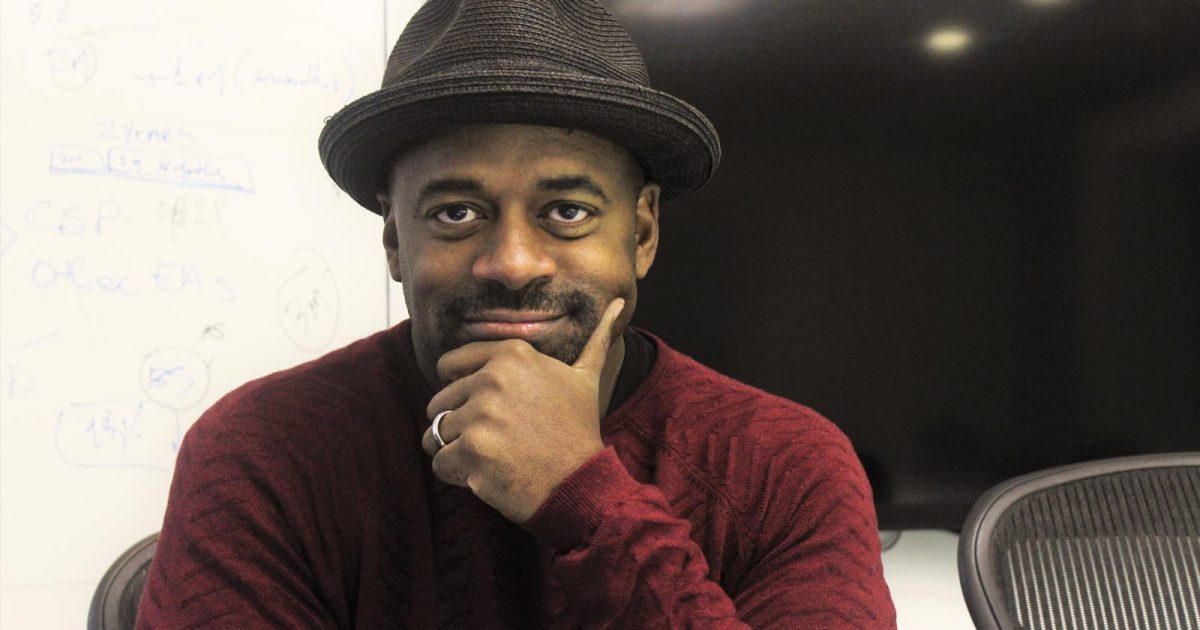
So he worked with HR and helped kicked off BAM Brazil. He was learning that, sometimes, big ideas like this require many small steps forward and that complex challenges such as addressing social, political, economic, and racial diversity require perseverance.
Now, two years later, BAM Brazil has 13 members, which Rodney realizes might appear like little progress. But he knows you have to start somewhere.
Yet another surprise awaited Rodney after he helped kick off BAM Brazil. Some of the members who joined the group looked white.
“When I started BAM, we had members who, when you see them, you’d think they were white. But then I’d find out they were afro-descendent. It would turn out that their father was black,” he said. “In Brazil you have this incredible ‘mistura,’ this mix of backgrounds. You have to learn not to judge a book by its cover.”
BAM is more than a community; it helps recruit more-diverse candidates, and Rodney hopes that it will lead to eventually establishing more leaders of color. It’s involved in several community projects, such as funding a computer lab for an after-school program and teaching kids to program and learn English.
After establishing BAM Brazil, Rodney helped employees who were interested in starting employee networks for women and the LGBTQ community as well. Additionally, he’s working with community leaders on how to share the BAM story outside of Microsoft—calling this idea “BAM in a box”—so any company could implement the program easily into their workforce.
One of the things Rodney loves about Microsoft is that we are both a consumer company and an enterprise company, so our customers have many sizes, shapes, and shades of color.
“I believe the best companies and the best innovation comes from people with diversity of thought, diverse ideas, and diverse experiences all working together to develop technology. If we have one shade, one experience, one type of university background, how are we going to empower every person on the planet? It’s not possible without diversity,” he said.
“Diversity, though not explicit in the mission statement, is in the spirit of the company’s mission.”
And Rodney thinks Microsoft is one of the only companies that gives employees leeway to go ahead and establish programs like BAM.
“Microsoft gives me the opportunity to do something to drive impact and do my part to change the world,” he said. “I hope we never lose that.”
Rodney recently accepted a position back in Redmond as the vice president in Worldwide Enterprise Services Sales and plans to take the lessons he’s learned in Brazil with him, such as his motto: always be the dumbest person in the room.
“Being the dumbest person in the room forces you to hire people who are smarter and different from you. It’s our job to bring on the most intelligent people with diverse backgrounds and get the heck out of their way.”


